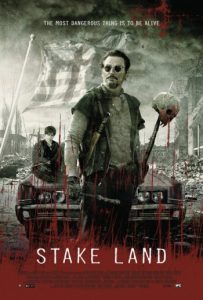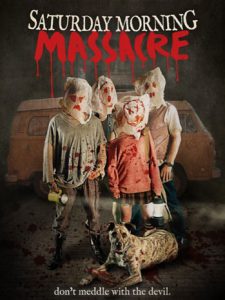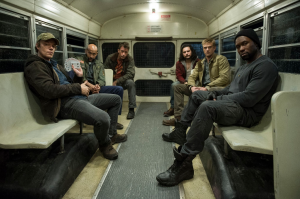The Purge: Anarchy (2014) review
There are many things that frustrate and confound in The Purge: Anarchy but chief among them is the lack of commitment to the more interesting and dynamic parts of the story. Instead of a conspiracy-laden twisteroo that it could have been, the film merely dances along those edges and instead opts for a familiar road-breakdown-survival as its primary story arc that, even at its best moments, feels tired.
What makes matters worse is that the characters we’re given to root for are, by and large, decently written. But again, passable characters taking up the focus of the film instead of giving over to a larger, more dynamic story about what ‘the purge’ really is and how it really came about is maddening. It’s like the parts are all there but the story stubbornly stays with the more pedestrian, tab A slot B aspects which lead to a wholly unsatisfying conclusion.
The story essentially picks up where the last one left off where the previous year’s purge has ended and we’ve now fast forwarded to the next one. This acknowledgement of it being a year later is only important for one character that makes an appearance later in the film and is so poorly and so unevenly handled that I think I muttered an expletive at the screen out-loud I was so surprised at how contradictory and dumb-headed it ends up being. The purge, you’ll remember from the first film, is a way that society figured out how to reduce poverty, crime and establish a kind of 364.5 days a year civility and one 12 hour period of lawlessness that affords people the ability to purge their souls – or something to that effect.
In any event, the film sets out and darts between a few different groups of people: a husband and wife on their way to safety who stop at what must be the most seedy grocery store in the greater Los Angeles area. A group of wait staff at a diner who disburse almost immediately after they are introduced which serves only to give us our primary and her connection to a co-worker who will show up later. The primary here is a single mother (played really well by Carmen Ejogo) who is headed back home to her stodgy father (the always welcome John Beasley) and headstrong, purge-hating daughter (the rock-solid Zoë Soul). We’re then introduced to Frank Grillo’s Sergeant/everyman who is clearly mounting up to get something done relating to his dead son once the purge time starts. Very easy to see that we’re going to have all these people involved together sooner rather than later.
Dashing from each of our primaries to the next: the married couple run afoul of some street youths ahead of ‘commencement’ and are almost immediately in harm’s way. The single mom and daughter butt heads about the daughters interest in a non-violent (initially anyway) anti-purge movement to stop legalized murder and expose it for the class warfare and ugly thing it really is (or so it seems early on from videos she watches on the internet). Single mom’s father is kind-of stressy about the whole thing and goes to take a nap before things get going. Sergeant loads up his armor-plated car with guns and all manner of other stuff and we’re off and running.
Married couple are in a frantic race for their lives into the downtown area and run, more or less, headlong into some seriously well equipped semi-trucks and paramilitary looking dudes who seem to pick out certain spots and essentially invade buildings and/or mow down folks out in the streets purging to their heart’s content. Meanwhile, Seargent is driving around near the same area and spies another of these mysterious black semis parked and two women (our single mom and daughter) being dragged out of the building. He intervenes and while doing so, provides shelter in his car for married couple.
See? Like I said, they all end up together.
So now we’ve got our roving band of good-nics, the underlying problem of those black semi guys, the roving band of street guys looking all menacing and murdery and the greater problem of Sergeant’s car being shot up badly. Single mom knows somewhere to go and someone that’ll get him a car – so bingo! we’ve got our destination. So off they go on their quest.
But dammit, the black semi-guys story, origin, goals, organization etc etc are ten times more interesting than a road survival story for our unlikely band of folks. And double dammit, the rich versus poor aspect of the purge (which is hinted at in a wonderfully dark scene with single mom’s father) is fifty times more interesting that the quest to retrieve the car for Sergeant. It is a fork in the road at which the film gleefully and dumb-headedly skips down the wrong path. It’s as if you as the viewer can see the potential of a really interesting, subversive story starting to take shape – but – not so fast, we have to give you a middle part of the movie that is interminable and dull and not remotely compelling first.
Things go the way you expect them to with near misses and run-ins with other street violence etc etc etc – until we jump right back into the rich versus poor roots of the purge again and, again, the film seems like it is going to dive into political territory in a bold and striking way. But no sooner does that happen along with the re-introducing the anti-purge folks into the delightfully sinister ‘Most Dangerous Game’ situation that our intrepid traveling group has found themselves in, then all manner of credibility, continuity or moral themes go right out the damned window.
Through a complete abandonment of what makes the anti-purge people so interesting, the film suddenly becomes the final act of Bad Boys 2 or The Expendables or some other big time, shoot-em-up thing with not a whisper of a larger moral message to be had. ‘Shoot-out at the brain-dead corral’ was the phrase that kept bounding around my head at this point. So once the film completely screws up its chance to say something interesting about the conspiracy of ‘the purge’ and the ‘new founding fathers’ – then we’re thrown right back over into the travails of our traveling group and the culmination of Sergeant’s quest and what he was really up to from the onset.
The jarring shift from big-gun-killy-purgey action stuff to the more personal, almost intimate culmination of Sergeant and the single mom’s stories is clumsy and tough to hook into – mainly because you’re still reeling from the abject stupidity displayed in the anti-purge folks’ actions and how that all plays against the rhetoric shown earlier in the film.
This all comes to a head in a sequence of scenes that, in a different movie, would have felt emotional and amazing. What it is to kill without the threat of being arrested – or more importantly, know you could be killed by someone without consequences. It’s the third table leg of what would have been a dynamic and forward-thinking film. The first two being the rich versus poor origins of the purge and the second being the shadowy black semi guys and what their whole deal is.
But instead, you get the road stress and suspense you’ve seen 100 times before, you get the rag-tag bunch of unliklies you’ve rooted for 1000 times before and you get so little big-thinking that once you reach the finale, you’ve left not with anger so much as just indifference. It makes no impact and leaves very little trace.
Is it well shot? Yes, very much so. Is it well acted? Yes, surprisingly. Is it heavily violent? Not as much as you’d think. Does Sushi Girl‘s Cortney Palm make an appearance as a green-dressed rich lady? Yes. Does the film leave any mark on you 24 hours after seeing it? Nope, and that is a real shame given the chance they had to tell a much more bold, much better story within this lore they’ve created.












